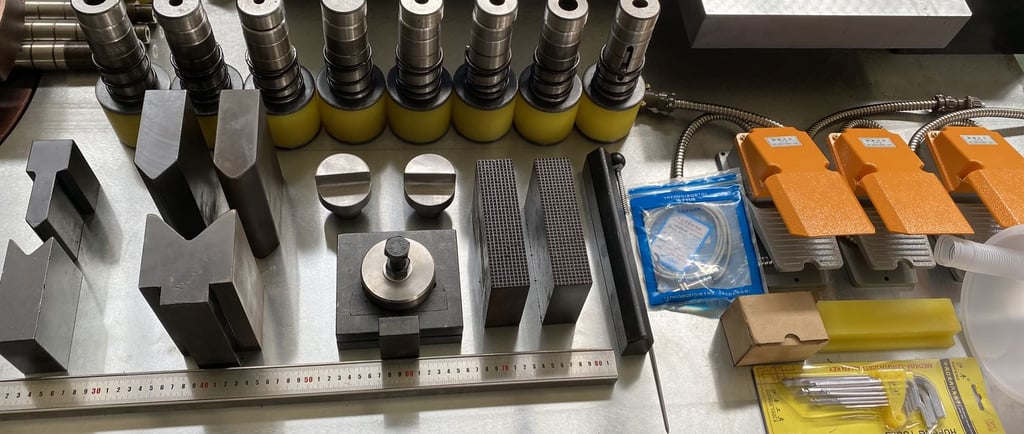Middle East Subcontractor Must See! How to Tackle Fragmented Projects in Saudi Arabia / UAE with Portable Busbar Machining Machines?
6/22/20255 min read


Understanding the Fragmented Project Landscape in Saudi Arabia and UAE
The construction and infrastructure sectors in Saudi Arabia and the UAE are characterized by a fragmented project landscape. This fragmentation arises from a multitude of factors, including a wide range of stakeholders, diverse project sizes, and varying execution timelines. Subcontractors operating in these regions must navigate this complex environment where projects can often be disjointed, involving multiple parties that each have their unique objectives and expectations.
One of the primary challenges subcontractors face is the coordination with numerous stakeholders, including government agencies, primary contractors, and various service providers. Each stakeholder often has different priorities, which can lead to misunderstandings and project delays. For subcontractors, ensuring clear communication and alignment of objectives is crucial in managing these relationships effectively, despite the fragmented nature of the projects.
The sizes of projects in the region range from small-scale renovations to large megaprojects, presenting another layer of complexity. Smaller projects may require quick turnaround times, while larger projects necessitate prolonged planning and execution periods. This discrepancy in timelines can create challenges in resource allocation and management for subcontractors, particularly when they are tasked with working on multiple projects simultaneously.
Furthermore, the pace of project execution in Saudi Arabia and the UAE can be exceptionally rapid, driven by the regions’ economic ambitions and development projects. Subcontractors must be adaptable and proactive, responding swiftly to any changes or demands that may arise throughout the project lifecycle. This need for adaptability is essential to avoid common pitfalls such as cost overruns, scheduling conflicts, and quality control issues.
Navigating the fragmented project landscape requires subcontractors to employ strategic project management techniques. By understanding the unique challenges and opportunities these projects present, subcontractors can position themselves for success amidst the complexities of the Saudi Arabian and UAE construction sectors.
The Role of Portable Busbar Machining Machines
In the context of fragmented projects in Saudi Arabia and the UAE, the significance of portable busbar machining machines cannot be overstated. These machines serve as an innovative solution to the common challenges encountered in electrical installations, particularly those that are characterized by their complexity and scattered execution environments. Traditional methods often fall short in addressing the unique requirements of on-site fabrication, where precision and efficiency are paramount.
One of the standout features of portable busbar machining machines is their ability to facilitate on-site fabrication. This capability greatly minimizes lead times, allowing contractors to meet tight project schedules without compromising quality. By allowing the machining process to occur close to the installation site, these machines reduce the logistics burden typically associated with transporting large busbars to a central fabrication location. Consequently, this not only streamlines workflows but also supports quick adjustments as project specifications evolve.
Moreover, accuracy is critical in electrical installations, as any discrepancies can lead to significant operational inefficiencies or safety hazards. Portable busbar machining machines are designed to deliver high levels of precision, ensuring that every busbar is produced to exact specifications. This precision mitigates the risk of errors, resulting in installations that are both reliable and compliant with industry standards.
In addition to enhancing efficiency and precision, these machines also offer cost-effective solutions for subcontractors and project managers. By reducing the need for multiple contractors to handle different aspects of the fabrication process, portable busbar machining machines consolidate tasks and minimize overhead costs. This ultimately contributes to the overall success of projects plagued by fragmentation, leading to more timely completions and satisfied stakeholders.
Best Practices for Subcontractors in Utilizing Portable Busbar Machining Machines
For subcontractors operating in the dynamic environments of Saudi Arabia and the UAE, the effective use of portable busbar machining machines can significantly enhance project efficiency and output quality. To achieve optimal utilization of these specialized tools, it is crucial to adopt best practices that encompass training, maintenance, and seamless integration into existing workflows.
First and foremost, proper training is essential for personnel who will be operating the portable busbar machining machines. Subcontractors should prioritize comprehensive training programs that not only familiarize workers with the technical aspects of the machines but also emphasize safety protocols. Training sessions should be designed to cater to different experience levels, ensuring all operators possess the requisite skills to efficiently and safely handle the equipment. Additionally, investing in ongoing training can keep the workforce updated on the latest technologies and techniques in busbar machining, leading to improved overall productivity.
Equally important is the maintenance of portable busbar machines. Regular maintenance checks can prevent breakdowns, thereby ensuring that the machines function optimally and efficiently throughout the project duration. Subcontractors should develop a detailed maintenance schedule that includes routine inspections, cleaning, and timely replacements of worn-out parts. By maintaining the machines proactively, subcontractors not only minimize downtime but also extend the equipment's lifespan and performance capabilities.
Furthermore, integrating portable busbar machining operations with existing workflows is vital for achieving streamlined project execution. This can be accomplished by coordinating closely with other project stakeholders, including electrical engineers and contractors. A collaborative approach can help identify where busbar machining fits naturally within the project timeline, thereby enhancing workflow efficiency and reducing friction between various teams. Subcontractors should encourage open lines of communication to foster a collaborative environment, ultimately driving successful outcomes in their projects.
Case Studies: Success Stories from the Field
In recent years, several subcontractors in Saudi Arabia and the UAE have successfully integrated portable busbar machining machines into their operations, showcasing the technology's potential in addressing the challenges of fragmented projects. One prominent case study involves a large-scale electrical installation project in Jeddah, where a subcontractor faced significant delays due to the complex layout of the site. The installation involved multiple busbars, varying in sizes and specifications, requiring precise machining and fitting. By employing portable busbar machining machines, the subcontractor was able to execute on-site modifications swiftly. This innovation not only reduced downtime but also improved the overall accuracy of the installations, leading to a project completion that exceeded the client's timeline expectations.
Another successful implementation occurred in the UAE, where a subcontractor was tasked with upgrading the electrical infrastructure of an existing facility. The fragmented nature of the renovations necessitated working in confined spaces while maintaining high-quality standards. The use of portable busbar machining machines allowed the team to perform tailored machining right at the site, accommodating the installation's specific needs without extensive logistical challenges. Feedback from the project manager highlighted a marked increase in productivity, as the machines facilitated quick adjustments and reconfigurations, ultimately leading to a reduction in material waste and labor costs.
A further noteworthy example is seen in a renewable energy project in Abu Dhabi, where integrating portable busbar machining provided an innovative approach to fast-tracking the connection of multiple renewable sources to the grid. The dynamic and evolving nature of such projects often leads to unforeseen complications. However, the flexibility of the portable machinery allowed teams to adapt to changes on the fly, thus ensuring consistent progress. The resulting efficiency not only met but also inspired new standards for future projects in the region.
These case studies underscore the transformative impact of adopting modern solutions, such as portable busbar machining machines, in fragmented projects across Saudi Arabia and the UAE. By leveraging innovative technology, subcontractors can significantly enhance project efficiency, proving that adaptability is key in navigating the complexities of today's construction landscape.
Innovate
Leading manufacturer of busbar processing equipment solutions.
Contact
Support
+131 2713 4627
© 2025. All rights reserved.
